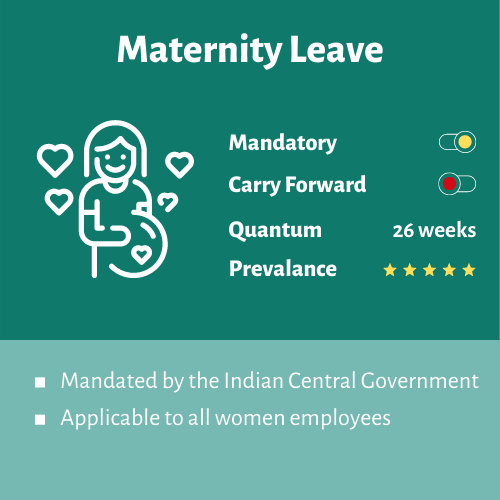

Maternity Benefit Act of 1961 requires that employers have to provide 26 weeks of paid leave to any woman who has worked for at least 80 days in the 12 months preceding the expected delivery date.
While state laws govern the preceding three types of leaves (AL/CL/SL), the Maternity Benefit Act is a central government act.
This leave is applicable for the first two children only. In case of a third child, 12 weeks of leave can be availed. The Act also provides for mandated leave in case of miscarriage, adoption, surrogacy and tubectomy.
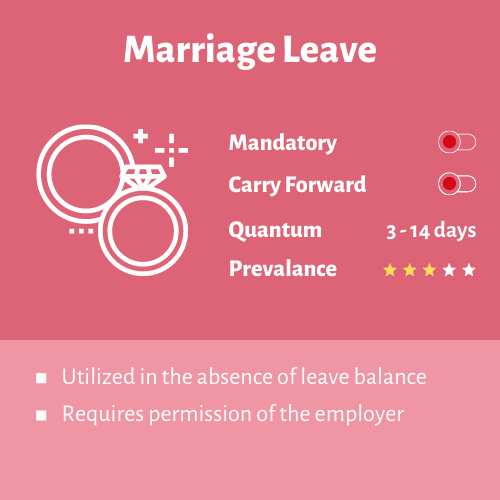
Some companies provide a special leave for employees getting married called Marriage Leave.
While it's mandatory in a handful of countries like Malta, Vietnam, etc., marriage leave is not a legal entitlement in most countries, including India.
The marriage-leave grant is for anywhere between 1 to 15 days. However, most companies tend to give three days of marriage leave as a norm.
The HR department may require either as an invitation card or a marriage certificate as documentary proof for approving the leave.
Further, the eligibility is for only once during the employee's entire employment period in the organization. So, in remarriage or multiple marriages, employees will have to utilize their annual leave balances or even go on leave without pay.
Another rule that is sometimes applied is that only the first legal marriage of the employee is allowed. For example, take a case of an employee, Liz Taylor, who married a few years ago while working in a previous company. Subsequently, Liz divorced and joined a new company. (Of course, it was not at the same time and not for the same reasons!) Now, Liz has decided to tie the knot, yet again. Good wishes for a happy married life, but no, she does not get any marriage leave.
At times, due to work pressure, employees may get married and immediately return to work. Once the project is over, they may go on a honeymoon after a few weeks. To handle such situations, a company can allow the marriage leave to be taken anytime during the first eight weeks of marriage before the grant expires.
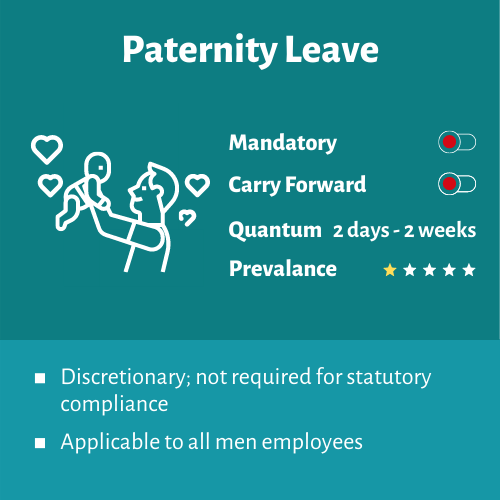
The Paternity Leave is a leave offered to expectant fathers after a child is born. It is a leave meant for the father to take care of the newborn and the mother. A newer terminology for this type of leave is to call it a New Parent Leave to also cater to LGBT and same-sex couples’ needs and avoid discrimination.
So far, there is no requirement from India’s labor laws to provide Paternity Leave in India.
However, many progressive companies are offering Paternity Leave to their employees. The leave entitlement varies from 2 days to 4 weeks and depends entirely on the employer's policies. If the company grants this leave type, it has to be availed within a specific time (for example, within eight weeks from the baby’s birth).
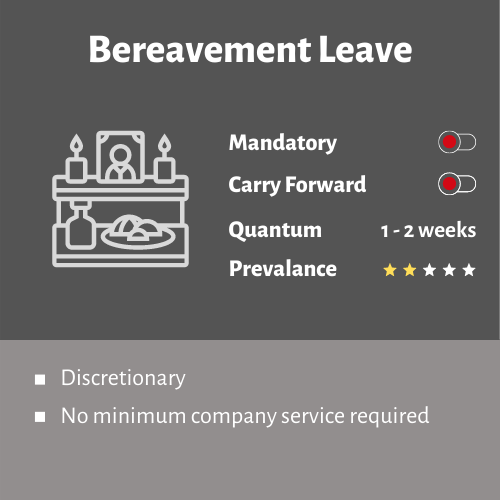
Bereavement Leave is a leave type granted when there is a death in the family or losing a loved one. This leave is for participating in the last rites or funeral services, taking care of any personal matters, and most importantly, to grieve.
This leave type is also termed compassionate leave. However, compassionate leave is extended not just for the death of a loved one but also to take care of a dependent or a sick relative.
Offering this leave type to employees is not required by law in India. However, many progressive companies offer bereavement leave from 2 to 20 days.
Some companies grant bereavement leave for a pet’s death (around two days.)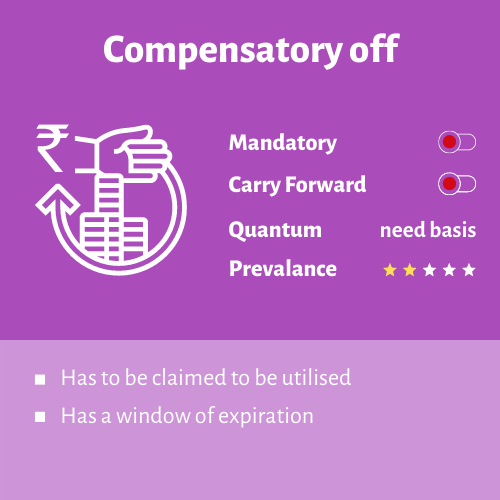
If an employee has to work on a weekend or a holiday due to the priority of the deliverables, they are offered a compensatory off on any other workday.
Since these leaves depend on the business requirements, the grant of these leaves happens on a case by case basis. There is a process for claiming and availing comp-off leave.
The employee has to claim comp off after having worked on a non-working day. This request is approved by the immediate manager and then forwarded to HR. Once approved, a comp-off leave is granted to the employee.
Unlike many other leave types that lapse at the end of the leave-year, comp offs come with an expiry period of 4 to 8 weeks. The employee has to utilize this comp-off leave within this expiry period.
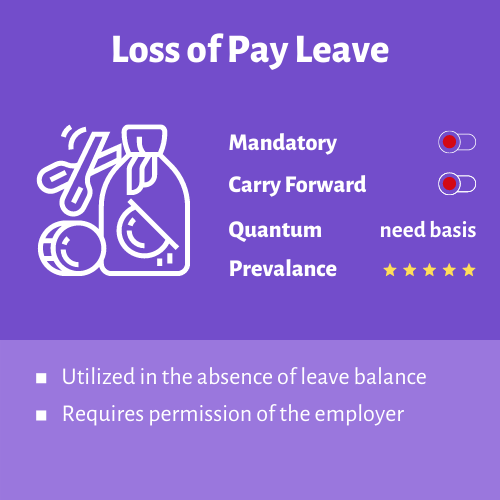
There are cases when an employee has exhausted all leave balance but still requires time-off for some exigency. In such situations, companies allow them to go on leave without pay (LWP). Since there is a loss of income (LOP) when an employee avails this type of leave, it's also called LOP leave.
Any leave availed in violation of leave policy is considered as LOP by some employers. For example, an employee going on vacation without prior intimation or approval. Or an employee not providing medical certificates in case of sick leave as per policy.
There is no concept of a leave balance in the case of LOP leave. But, during payroll processing, we need to deduct salary for the number of days of LOP leave during the month.